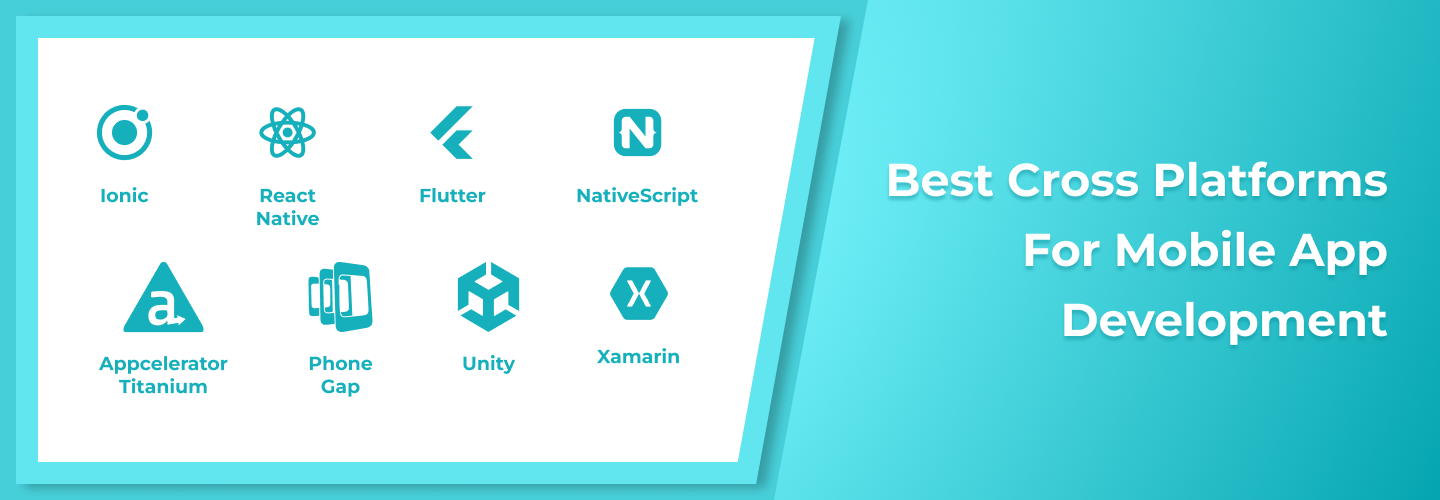Best Hybrid Platforms To Develop Mobile Apps
Hybrid -platform mobile applications have become increasingly popular over the past few years, as they have enabled developers to build their apps and deploy them on multiple platforms without having to rewrite the code in each platform’s native language.

What Is Hybrid -Platform Mobile App Development?
Hybrid -platform mobile app development is the practice of creating mobile apps that can be installed and used on multiple mobile operating systems. This means developers don’t have to write two separate pieces of code to develop the same application for both iOS and Android. Hybrid -platform mobile app development frameworks enable developers to use a single code base to build apps that can be deployed on various mobile platforms. As a result, these frameworks help developers save time, cost, as well as effort.
There are a number of Hybrid -platform tools available, but in order to select the best one for your project, you’ll need to do some research and consider the following elements:
1. Performance
Performance is a crucial factor to consider when selecting a Hybrid -platform for mobile app development. You want to ensure that your app runs smoothly and efficiently, so you’ll want to pay attention to the platform’s ability to scale up, offer better performance, and utilize the latest technology.
2. Cost
Cost is also an important factor when selecting the best Hybrid -platform. Different platforms may have different price points, so you’ll need to factor this in and compare the costs. Select the platform that fits your budget and yet meets your app development needs.
3. Security
Security is another important element to consider. While you want to ensure that your app performs well, you’ll also want to keep in mind that it needs to remain secure. You’ll want to select a platform that offers a secure code base and encryption protocols.
4. Support
Support is a critical element when developing an app on a Hybrid -platform. You’ll want to have access to developer resources and customer support. Look for platforms that offer extensive documentation and ongoing support.
5. Compatibility
You’ll also want to consider compatibility when selecting a Hybrid -platform. It’s important that your app works with both iOS and Android platforms, so make sure the platform you select is compatible with both.

The Best Hybrid Platforms For Mobile App Development
There are various Hybrid -platform mobile app development frameworks available today, such as React Native, Flutter, Xamarin, and Ionic, to name a few. These frameworks can be used to develop high-quality, feature-rich, and reliable mobile applications for both iOS and Android platforms.
Here’s a look at some of the best Hybrid -platforms for developing mobile applications:
Ionic Framework
Ionic is a hybrid -platform framework that is built on HTML, CSS, and JavaScript. It runs on multiple platforms, including iOS, Android, and Windows Phone. Ionic has a rich component library that makes it easy for developers to create attractive user interfaces. It also allows developers to use reusable components, which helps reduce the complexity of code. Additionally, Ionic comes with a powerful Command Line Interface (CLI) that enables developers to quickly and easily scaffold projects.
React Native
React Native is a hybrid -platform framework based on Facebook’s JavaScript library, React. It allows developers to create native-like apps for Android and iOS using a single codebase. React Native increases the speed of development as it uses a separate thread for running UI-related tasks. It also facilitates easier testing and debugging as developers can use the open-source Chrome debugger. This makes React Native a great choice for developing hybrid -platform apps.
Flutter
Flutter is an open-source mobile app development framework developed by Google. It allows developers to create apps that run on both Android and iOS. Flutter uses the Dart programming language and uses its own rendering engine to compile apps. This helps developers to create apps with smooth animations and high performance. Additionally, Flutter provides a rich library of widgets that can be used to build beautiful native-like user interfaces.
NativeScript
NativeScript is a framework that allows developers to create native apps for multiple platforms with less development time. It is based on JavaScript and provides access to device-level APIs on Android and iOS. It also supports the development of plugins for Android, iOS, and Windows platforms. This enables developers to extend their apps with third-party services like Payment Gateways, Analytics, or CRM.
Xamarin
Xamarin is a hybrid -platform development platform developed by Microsoft. It allows developers to write apps using C# and .NET technology and share the same code across multiple platforms. This makes Xamarin a great choice for developers who want to create a single codebase for their apps. Additionally, it provides access to the native API and UI components for Android, iOS, and Windows platforms.
Adobe PhoneGap
Adobe PhoneGap is an open-source mobile development platform for creating mobile apps with HTML, CSS, and JavaScript. It works on a variety of platforms, such as Android, iOS, and Windows Phone. It also has integration with other Adobe tools, such as Dreamweaver and Photoshop, for creating better applications.
Unity
Unity is a popular game development engine that allows developers to create 2D and 3D games for mobile and desktop platforms. It is also useful for creating other interactive mobile applications. It is able to deploy applications on various platforms such as Android, iOS, Windows, and the web. Additionally, it also supports a variety of scripting languages which makes it easy to create complex applications.
Ionic
Ionic is an open-source mobile app framework used to create hybrid -platform apps. It is based on the popular front-end framework Angular and leverages HTML, CSS, and JavaScript. Ionic allows developers to create responsive and interactive mobile apps that are compatible with iOS, Android, and Windows. The framework also offers access to several tools to speed up the development process.
PhoneGap
PhoneGap is an open-source mobile app framework. It allows developers to create mobile apps with HTML, CSS, and JavaScript. It is an Adobe-owned technology and provides access to a set of APIs and plugins to enhance the app development process. PhoneGap is a great option for those who wish to develop apps with a low budget, as it is free to use.
Appcelerator Titanium
Appcelerator Titanium is a hybrid -platform development platform from Appcelerator. It uses JavaScript and a customized version of HTML and CSS to create great-looking apps that offer excellent performance. Appcelerator Titanium also uses a single codebase, which allows developers to update and maintain their apps easily.

Advantages Of Hybrid -Platform App Development
Hybrid -platform app development has a lot of great benefits that make it a popular choice among mobile app developers. Some of the pros of using a hybrid -platform to develop mobile apps include:
Increased Development Speed
Hybrid -platforms allow developers to save time and speed up the development process. Rather than having to create and maintain separate codebases for different platforms, developers can create one codebase used for both iOS and Android. This saves developers time and money, making development faster and more efficient.
Cost-Effective
Another advantage of using a Hybrid -platform to develop apps is that it is a cost-effective solution. Since developers only need to create and maintain one codebase, the cost is much lower than developing separate codebases for each platform.
Easy to Learn
Most Hybrid -platforms are easy to learn, making them a great option for developers of all skill levels. Most offer tutorials and documentation to help beginners get up and running quickly.
Support for Multiple Devices
With a Hybrid -platform, developers can target multiple devices, including tablets, phones, and other emerging devices. This is a great benefit for developers who want to reach the widest possible audience.

Disadvantages Of Hybrid -Platform App Development
Despite the many pros of using a hybrid -platform to develop mobile apps, there are some cons that should be considered. These include:
Platform Limitations
Depending on the hybrid -platform, developers may be limited in the functionality they can incorporate into their apps. Some platforms may not support certain features or third-party components.
Performance Issues
Performance issues can arise when developing with a hybrid -platform. It is due to the fact that the code must be optimized for each platform separately. This means that an app may run smoothly on one platform but not on another.
Lacks Native Feel
Some hybrid -platforms may not offer the same native feel as apps developed with native development tools. This can result in an app lacking the look and feel of a traditional native app.

How To Get Started With Hybrid -Platform App Development?
Once you have chosen a suitable framework for your mobile app development project, the next step is to create a plan on how you’re going to build it and test it.
First, you will need to decide on the platform you want to build your app for. Once that’s done, start by brainstorming your app idea, sketching out its features, and listing down any other requirements that you may have.
Once you have a clear vision of what your app will do, you can then start building it. Start by creating the basic structure of your app, including its navigation and user interface. Once you’re happy with the design, you can then move on to coding your app. Make sure you document all your code and use versioning tools to track any changes easily.
Once your application is ready for testing, you can use the app testing tools available for each of the platforms you’re targeting. This will enable you to pinpoint any issues before it goes live.
Finally, you will need to package your application into an installer file, ready for deployment.
Final Words:
Hybrid -platforms are a great way to reduce the time and cost of development for mobile apps. In this article, we discussed some of the best hybrid -platforms that developers could use to create apps for multiple platforms. Each of these hybrid -platforms has its own advantages and disadvantages, so it’s important to choose the one that best meets your needs.

TABLE OF CONTENT
